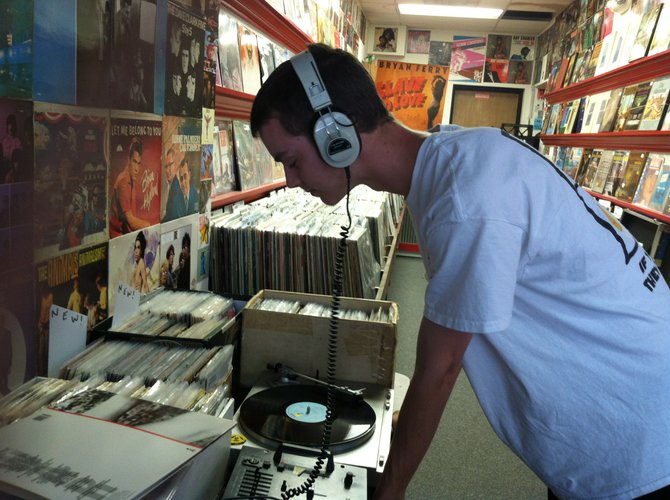Arlington — Spencer Leach walks in to CD Cellar carrying two brown paper sacks and sets them on the store counter, where manager David Schlank takes a look inside. They are filled with CDs and vinyl records that Leach is trading to the store in exchange for more vinyl records.
In an age when music is always digitally accessible via apps like Spotify and iHeart Radio, consumers in their 30s, 20s and even teens are opting to purchase vinyl copies of their favorite albums. Retailers like Urban Outfitters carry stylish portable turntables in their stores, and everyone from Daft Punk to Lady Gaga is releasing their albums on vinyl. Listening to records is the cool thing to do again, and music stores are noticing.
"It's a trendy, novelty sort of thing," said Schlank, who said that CD Cellar has been buying and selling vinyls for about a decade now. "Kids who grew up listening to music on their iPods see it as something different. And people who have always bought vinyl, people in their 40s and up, are really happy places like this are still around."
CD Cellar is one of two small businesses in the Arlington area that specialize in selling vinyl. The other, Blue Groove Soundz, sells records and repairs turntables and other audio equipment as well. According to owner Gary Foreman, the merchandise that Blue Groove carries is about 95 percent vinyl.
"Vinyl is true, it's real," Foreman said. "It's where it originated, and it has come back strong. Young people are bringing it back."
Foreman said he believes that artists themselves are largely responsible for the trend. Jack White, he pointed out, has been pressing to have his work on vinyl for years.
Schlank agrees.
"Bands like The Black Keys are in the camp of folks whose fans have always bought vinyl, and they were just waiting for it to become fashionable again," he said. "I think artists like Justin Timberlake and Katy Perry are doing it because it's popular now. Fans will buy it, and they're latching on to the popular thing right now."
Gen-Yers and Millennials have various reasons for choosing vinyls over digital copies of albums. For some, it means recognizing the amount of work it takes for an album to be produced.
"With vinyls having the larger artwork, you can see everything that was intended for the listener," Leach said. "Whoever's recording the music is putting something on there, but they're also hiring someone to put a visual aspect to it, and that's equally important." He said that he likes to see everyone involved in the work, including who produced and engineered the album, and he likes that the information is included with the hard copies of albums.
For Arlington resident Jackson Freeman, 17, it's about being part of a culture.
"My sister listened to Fergie and The Cheetah Girls, and my parents don't listen to music that much, so I never really had music around me," Freeman said. He said that he had some friends in the neighborhood whose parents were fans of classic rock, so that's the kind of music that Freeman was drawn to.
"I know they do sell classic rock on iTunes, but I just figure this is a lot cooler," said Freeman, who received a turntable for Christmas. "I like not just listening to it, but being a part of the culture."
THE CULTURE CONTINUES to spread. Foreman said that Blue Groove Soundz has been in business for four and a half years, and plans are in the works for a recording studio and record label to launch there later this year.
CD Cellar opened its first store in Falls Church in 1992, and opened a second location in Arlington a decade ago, according to Schlank. That was around the time the business decided to invest in buying and selling vinyl. Schlank said that the bulk of records that customers bring to trade in are records from the '60s, '70s, and '80s. The store orders new records as well, including remastered copies of classic records. "People can't always afford to spend the collector's price for something," he said. "You can pay big bucks for a Miles Davis original, or you can buy a remastered version."
According to a report released by the Recording Industry Association of America, sales of physical copies nationwide only accounted for 35 percent of album sales last year, giving way to digital downloads and subscription services. But the report also mentions that vinyl sales grew 33 percent up from 2012, making vinyl a $211 million industry in 2013.
"We have classical music on vinyl, we have jazz from the '30s, but we also have music to suit the tastes of modern music lovers," said Schlank. "So on any given day, there's somebody in their teens and somebody in their late 60s shopping for records. One reason we've lasted so long is that we try to cater to a wide variety."
